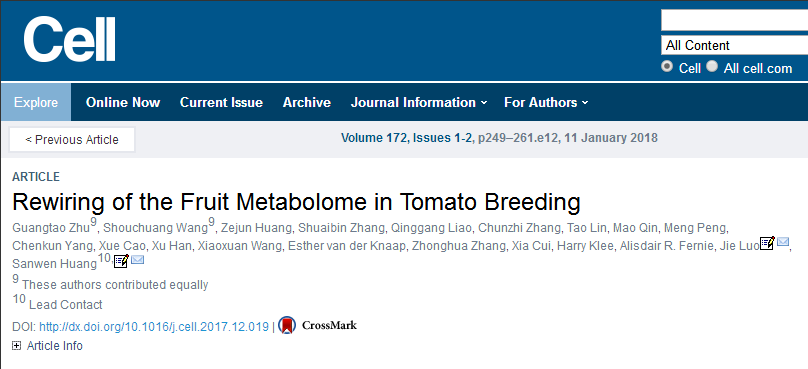
On 11st, January 2018, Cell, as one of the top international academic journals, published Prof. Jie Luo's Group from National Key Laboratory of Crop Genetic Improvement and Prof. Huang Sanwen from Shenzhen Institute of Agricultural Genomics, Chinese Academy of Agricultural Sciences on the topic of tomato breeding new Progress in research on the change of metabolome and its genetic basis.
In the paperRewiring of the fruit metabolome in tomato breeding, the first systematic is reported on the effect of human breeding on tomato metabolism in the breeding process. Tomatoes are the most widely grown vegetable crops in the world. They originated from the Andes in South America. After the domestication and improvement of wild tomatoes, the ornamental tomato and modern cultivated tomato were cultivated. In order to comprehensively interpret the metabolic changes in the process of tomato breeding, the metabolomic analysis of more than 600 samples showed that the content of SGAs, decreased gradually during the breeding process from wild tomato to cultivated tomato. Further genetic analysis revealed that the natural variation of SGAs was controlled by five major genetic loci and that these loci were strongly chosen during domestication and improvement. One of the most potent sites was a gene cluster located on chromosome 10 containing P450 oxidoreductase, acyltransferase and glycosyltransferase, and found that a point was found on the exon of glycosyltransferase (Solyc10g085230). The mutation caused an premature stop code, significantly reducing the content of SGAs in cultivated tomato fruits. By the two main effect sites, the main SGAs content can be reduced by 80%. Cultivation of tomatoes in the selection of human domesticated a variety of differentiation occurred, the differentiation of red fruit is a typical representative. Consumers are fond of pink fruits due to the texture of soft, delicate taste. Studies have shown that fruit breeding is a mutation in the promoter region of the transcription factor SlMYB12 that results in a low level of transcription, resulting in a significant decrease in the content of flavonoids in the fruit. In addition, the study also showed that the selection of fruit weight genes and the effect of wild introgression fragments on the metabolome during tomato breeding revealed the hitchhiking of metabolic group changes during breeding. The study uses multi-group method to conduct a panoramic analysis of the breeding process, and its big data resources will also promote the study of tomato nutrition and health quality improvement.
Dr. Guangtao Zhu, a postdoctoral fellow at Shenzhen Institute of Agricultural Genomics, and Shouchuang Wang, doctoral student at HZAU, were co-authors of the paper, San-wen Huang and Professor Jie Luo. This research has been funded by the National Outstanding Young Scientists Fund.
Paper link: http: //www.cell.com/cell/fulltext/S0092-8674 (17) 31499-X
Audit: Jie Luo